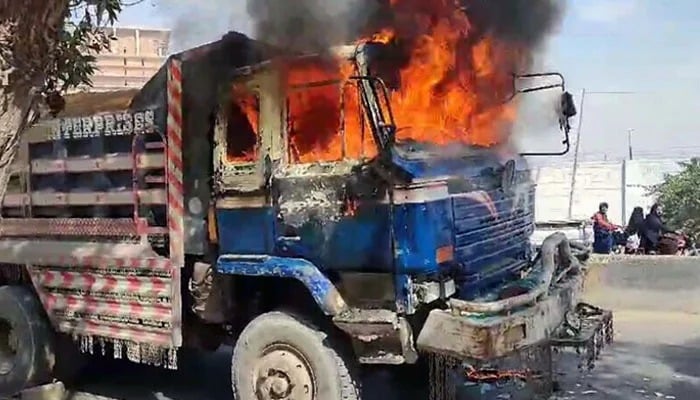Karachi roads turn deadly amid surging traffic accidents
Number of dumpers operating in the city has grown leading to rise in fatal accidents
KARACHI: Amid escalating traffic congestion and a surge in fatal accidents involving heavy vehicles, the Sindh government has enforced restrictions on the entry of dumpers into Karachi.
Under the new directive, dumpers will only be allowed to operate between 11pm and 6am, effectively barring them from city roads during peak hours in an effort to curb accidents and enhance road safety.
This restriction, however, is not a new measure. Over the years, multiple notifications have been issued limiting the movement of heavy vehicles from midnight to early morning. Yet, legal loopholes and ongoing infrastructure projects have often been used to justify their continuous presence in the city throughout the day.
Dumpers transporting construction materials such as cement, sand, and gravel have long been granted access under the pretext of avoiding disruptions to infrastructure projects.
Despite these limitations, the number of dumpers operating in Karachi has grown significantly, leading to a surge in traffic accidents. Areas like Malir and Korangi become hotspots for such incidents, with frequent mishaps occurring on the National Highway, Super Highway, and major city roads like Sohrab Goth and the Hub Road.
The alarming increase in road fatalities has pushed the authorities to take action. In the past two months alone, 100 people have died in traffic accidents in Karachi, with 72 fatalities in urban areas and 24 in the suburbs. Among these, eight people lost their lives in four separate dumper-related accidents.
In response, Sindh Chief Secretary Syed Asif Hyder Shah chaired a high-level meeting addressing traffic safety concerns.
It was decided that all vehicles operating in Karachi must obtain a QR code certificate from the Transport Department. Heavy vehicles and their drivers will undergo physical verification to ensure compliance with safety standards. Additionally, the Sindh Solid Waste Management Board has been directed to shift its operations to nighttime within three months.
Also, the Karachi Water and Sewerage Board’s tankers will be inspected within a month for safety compliance. A fourfold increase in traffic fines has been proposed to curb violations and enhance road discipline and reckless drivers will face FIRs along with fines to ensure accountability.
While water tankers play a crucial role in Karachi’s water supply, concerns have been raised about their unrestricted movement. These tankers operate 24/7, despite hydrants not being functional round the clock. There is the need for designated operating hours to regulate tanker movement and prevent them from contributing to traffic congestion and accidents.
Another critical factor contributing to Karachi’s traffic woes is the exponential increase in motorcycles and Qingqi rickshaws. Karachi has over 4.3 million motorcycles, with more than 100,000 new registrations annually.
The lack of a viable public transport system has forced citizens to rely on motorcycles, leading to congested roads and frequent accidents. 55% of all road accidents in Karachi involve motorcyclists. The absence of proper public transport has led to a proliferation of Qingqi rickshaws, which operate without regulation, further exacerbating traffic issues.
Despite the presence of the Traffic Engineering Bureau under the Karachi Development Authority (KDA), there appears to be little active enforcement of road planning.
While Lahore has introduced dedicated motorcycle lanes, Karachi’s attempt to implement a similar initiative lasted only a week. Experts argue that sustained awareness campaigns, in collaboration with NGOs and media, are essential to instill traffic discipline among citizens.
The development of an efficient public transport system is crucial to reducing reliance on motorcycles and Qingqi rickshaws. Strict regulations on heavy vehicles must be enforced, including maintaining a database of dumpers and their drivers.
Sustained traffic awareness campaigns should be implemented to educate citizens on road safety. Transparency in road planning and infrastructure development is essential to ensure the effectiveness of these measures.
-
Security forces gun down 30 terrorists in multiple IBOs in KP: ISPR
-
MQM-P calls for new province in Sindh
-
US report validates Pakistan military edge over India: PM
-
Banned TTP poses serious threat to Pakistan security: UNSC panel
-
CM Afridi clarifies remarks on by-poll after ECP requests army deployment
-
Dubai sees 3.2m Pakistani passengers in 2025 as airport sets new milestone
-
Security forces kill 23 Indian proxy terrorists in KP's Kurram
-
Pakistan to construct island to boost oil exploration: report












